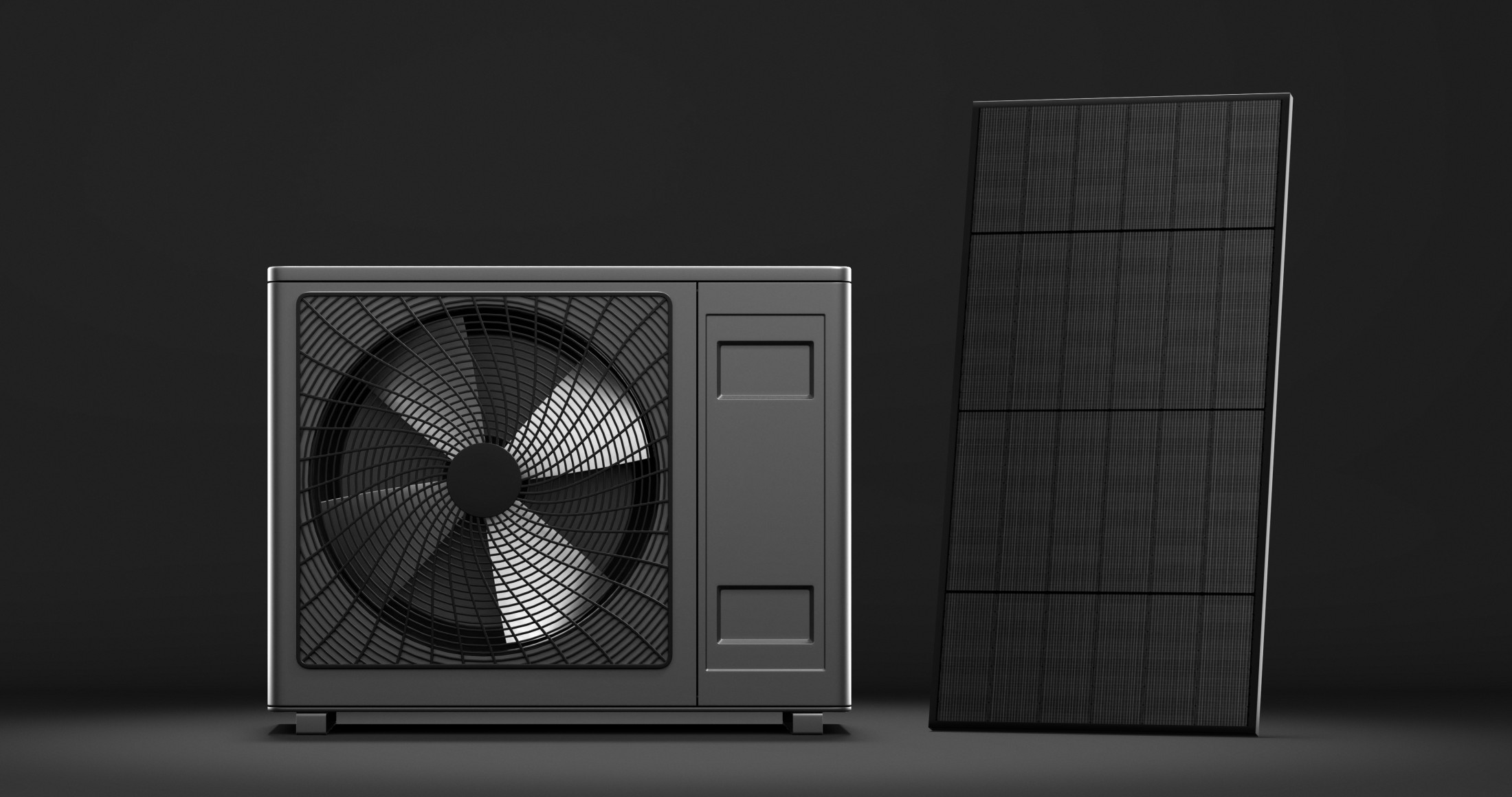
As environmental awareness grows and the impact of climate change becomes more pronounced, Canadian homeowners are increasingly turning to renewable energy solutions to power their homes. This shift is driven not only by a commitment to sustainability but also by the tangible benefits of reduced energy costs and increased energy independence. Among the various options available, the integration of heat pumps with renewable energy sources, especially solar energy, stands out as a particularly effective approach.
Heat pumps are versatile systems that provide both heating and cooling, making them ideal for Canada's diverse climate. When powered by renewable energy sources such as solar panels, these systems offer an eco-friendly alternative that aligns perfectly with the national agenda for a greener future. This combination not only helps reduce the carbon footprint of individual homes but also contributes significantly to the broader goal of reducing greenhouse gas emissions across the country.
Why Heat Pumps?
Heat pumps are an innovative technology that serves a dual purpose: they can heat your home during the cold Canadian winters and provide cooling during the warm summers. Unlike traditional heating systems that generate heat by burning fuel, heat pumps transfer heat from one place to another using a small amount of energy.
This process involves an outdoor unit and an indoor unit that work together to extract heat from the outside air—even in cold weather—and transfer it indoors. In warmer months, the system reverses, pulling heat from inside the house and releasing it outdoors, thus cooling the interior.
How Heat Pumps Work
Heat pumps operate through a sophisticated yet efficient process that involves several key steps. Initially, the outdoor unit of the heat pump absorbs heat from the external air—even in colder temperatures—using a refrigerant fluid that flows within a closed loop system. This absorption of heat is the critical first step.
Once the heat is absorbed, it undergoes a process of compression, where its temperature is significantly increased. After compression, the now heated refrigerant is circulated through the indoor unit of the heat pump, effectively releasing heat into the home and warming the interior.
During warmer months, this process is reversed to cool the home: the indoor unit extracts heat from inside the house and transfers it outside, utilizing the same cycle but in the opposite direction. This dual capability makes heat pumps an exceptionally versatile solution for both heating and cooling needs. (How Heat Pumps Work)
Benefits of Using Heat Pumps
- Energy Efficiency: Heat pumps are highly efficient because they transfer heat rather than generate it by burning fuel. This efficiency can lead to significant savings on utility bills.
- Environmental Impact: By utilizing electricity and the ambient air, heat pumps reduce the reliance on fossil fuels and decrease greenhouse gas emissions. This is particularly beneficial as Canada continues to increase its capacity for renewable power generation.
- Versatility and Convenience: With the ability to both heat and cool, heat pumps are an all-in-one system that eliminates the need for separate heating and cooling units.
- Longevity and Reliability: Heat pumps are known for their durability and can operate effectively for up to 15 years or more with proper maintenance.
- Improved Indoor Air Quality: Unlike systems that burn fuel, which can produce indoor pollutants, heat pumps circulate and filter air, reducing humidity and improving the overall air quality inside your home.
Heat pumps represent a smart choice for Canadian homeowners looking to improve their home’s comfort levels while also making an environmentally conscious decision. The integration of these systems with renewable energy sources like solar panels further enhances their sustainability and cost-effectiveness.
Synergy Between Heat Pumps and Solar Energy
The integration of heat pumps with solar energy represents a significant advancement in sustainable home heating and cooling solutions. This combination not only leverages the benefits of each system but also enhances the overall efficiency and cost-effectiveness of home energy management.
Powering Heat Pumps with Solar Energy
Heat pumps typically require electricity to operate their compressors and fans. By connecting these systems to solar panels, homeowners can use the electricity generated from solar energy to power their heat pumps. This setup ensures that the energy used is renewable and clean, which significantly reduces the household’s carbon footprint and dependence on grid-supplied electricity.
Solar panels convert sunlight into electricity during the day, which can be used immediately to power a heat pump or stored in batteries for use during cloudy days or nighttime. This direct use of generated power increases the efficiency of the energy consumed and ensures that the system is highly sustainable.
Enhanced Efficiency and Cost-Effectiveness
Integrating solar panels with heat pumps creates a loop of energy efficiency. The primary cost associated with running heat pumps—electricity—is offset by the solar panels, which provide a free energy source after the initial installation investment. This significantly reduces the ongoing operational costs.
Moreover, heat pumps themselves are already highly efficient because they transfer heat rather than generating it through combustion. When powered by solar energy, the efficiency of the system is further maximized, reducing waste and minimizing energy costs over time.
Example of Bosch Solar Solutions in Tandem with Heat Pumps
A prime example of this effective integration can be seen with Bosch solar solutions coupled with their advanced heat pump systems. Bosch offers photovoltaic solar panels that are designed to seamlessly integrate with their heat pumps, providing a reliable and consistent source of power. This synergy not only enhances the environmental benefits but also increases the economic returns by reducing utility bills even further.
Bosch’s commitment to providing integrated solutions helps homeowners achieve greater autonomy over their energy use while supporting the global shift towards renewable energy. The combination of Bosch solar panels and heat pumps is designed to deliver peak performance, ensuring that homes remain comfortable throughout the year, regardless of external weather conditions.
Incentives and Policies Supporting Renewable Energy in Canada
Canada's commitment to reducing its carbon footprint includes a variety of incentives and policies at the federal and provincial levels designed to encourage the adoption of renewable energy technologies. These incentives are particularly focused on integrating systems like solar energy and heat pumps into residential properties to make sustainable living both accessible and affordable.
Federal Incentives for Renewable Energy
At the national level, Canada offers several incentives that promote the use of renewable energy:
- Clean Energy for Rural and Remote Communities: This program primarily supports renewable energy projects in off-grid communities, but it also benefits those in urban areas looking to transition to renewable energy sources.
- Investment Tax Credit for Clean Energy Equipment: This incentive allows homeowners to claim a percentage of the cost of new clean energy equipment, including solar panels and certain types of heat pumps, reducing the overall investment needed for installation.
Provincial Incentives and Policies
Provincial governments also offer various programs and rebates that supplement federal incentives:
- Ontario’s Save on Energy Programs: These programs provide rebates for residential customers who upgrade to more energy-efficient systems, including heat pumps. The incentives aim to reduce the cost of purchase and installation, making these technologies more appealing to homeowners.
Encouraging Solar Energy and Heat Pumps
In addition to financial incentives, there are several policies aimed specifically at increasing the adoption of solar energy and heat pumps:
- Net Metering Programs: Many provinces, including Ontario, offer net metering programs that allow homeowners to send excess electricity generated by solar panels back to the grid in exchange for credits against their energy bills. This policy not only reduces energy costs but also maximizes the use of solar-generated electricity.
- Building Codes and Standards: Recent updates to building codes in various provinces emphasize the incorporation of energy-efficient technologies, including solar panels and heat pumps, into new home constructions and renovations.
These incentives and policies are part of a broader strategy to encourage Canadian homeowners to adopt more sustainable energy solutions. By taking advantage of these opportunities, homeowners can significantly reduce their upfront costs and long-term energy expenses while contributing to Canada’s environmental goals.
The combination of federal and provincial support makes the integration of heat pumps and solar energy a feasible and attractive option for many Canadians, paving the way toward a more sustainable and energy-independent future.
How Homeowners Benefit from Integrating Heat Pumps with Renewable Energy
Integrating heat pumps with renewable energy sources such as solar panels offers a multitude of benefits for homeowners. This fusion not only aligns with global sustainability goals but also brings significant personal advantages, including financial savings, increased property value, and a reduced environmental impact.
Cost Savings on Energy Bills
One of the most immediate benefits of using heat pumps powered by renewable energy is the reduction in energy bills. Heat pumps are already more energy-efficient than traditional heating and cooling systems because they transfer heat rather than generate it.
When these systems are powered by solar panels, the cost savings become even more significant. Solar energy can provide the necessary electricity to operate heat pumps without relying on the grid, particularly during peak daylight hours when energy consumption can be high.
Additionally, any surplus energy generated by solar panels can be stored or sold back to the grid, further reducing energy costs.
Increased Property Value
Homes equipped with modern, energy-efficient systems such as solar-powered heat pumps are increasingly in demand. Prospective homebuyers are often willing to pay a premium for homes that offer lower utility costs and eco-friendly features. This demand can significantly increase a property’s market value.
As energy prices continue to rise and environmental regulations become stricter, the value of having a self-sustaining, efficient home energy system is likely to increase even further. This makes the installation of solar panels and heat pumps a smart investment in the real estate market.
Contribution to Reducing the Carbon Footprint
By integrating heat pumps with renewable energy sources, homeowners actively contribute to the reduction of greenhouse gas emissions. Traditional heating and cooling systems often rely on fossil fuels, which emit carbon dioxide and other greenhouse gases that contribute to global warming.
In contrast, solar panels produce clean, green energy without emitting CO2. The combination of solar energy and heat pumps means less reliance on fossil fuels and a significant decrease in the home’s overall carbon footprint. This not only helps each homeowner reduce their environmental impact but also contributes to national and global efforts to combat climate change.
A Sustainable Future with Heat Pumps and Solar Energy
The integration of heat pumps with renewable energy sources, particularly solar energy, presents a compelling case for both environmental sustainability and economic efficiency. This powerful combination not only provides significant cost savings on energy bills due to the high efficiency of heat pumps and the cost-effectiveness of solar power, but it also enhances property values by equipping homes with cutting-edge, eco-friendly technology.
By adopting these integrated systems, homeowners make a substantial contribution to reducing the overall carbon footprint, helping to mitigate the effects of climate change. The use of renewable energy sources like solar panels decreases reliance on fossil fuels, leading to a cleaner, greener environment.
As Canada continues to expand its renewable energy initiatives and with numerous incentives and supportive policies in place, now is an ideal time for homeowners to consider transitioning to these greener technologies. By making this switch, not only do homeowners benefit financially and increase their property's value, but they also play a crucial role in the global movement towards sustainability.




